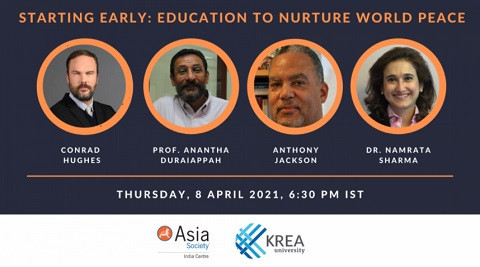
GCED Basic Search Form
Quick Search
当前位置
Events

The 2019 global youth climate strikes mobilized thousands of youths across the world demanding action from national and international leaders on climate change and environment-related issues. In 2020 the COVID-19 pandemic forced children and young adults to restrict their learning and pedagogy to the confines of their homes and computers. Since last year, the ugly turn of events with respect to racism shows us that no amount of technological and scientific progress can advance societies if the most fundamental issues remain unaddressed. As said by the former United Nations Secretary-General Ban Ki-moon, “Defeating racism, tribalism, intolerance and all forms of discrimination will liberate us all, victim and perpetrator alike.”
Global problems require global solutions. As global citizens, it is incumbent upon us, our communities, our intelligentsia and our education systems to find solutions and act on them. Global Citizenship Education (GCED), a concept promoted by the United Nations Educational, Scientific and Cultural Organization (UNESCO) offers critical solutions in this direction. The UN’s Global Education First Initiative notes “It is not enough for education to produce individuals who can read, write and count. Education must fully assume its central role in helping people to forge more just, peaceful, tolerant and inclusive societies.” Focussing on three key pillars of learning - cognitive, socio-emotional and behavioural, GCED aims at capacity building of global citizens to work actively towards building a society that promotes peace, inclusiveness, tolerance and equality for all.
UNESCO’s Asia and Pacific Regional Bureau for Education (UNESCO Bangkok) and the UNESCO Mahatma Gandhi Institute of Education for Peace and Sustainable Development (MGIEP), are leading the initiative by introducing new curriculum models, assessment patterns and improved teacher training modules across education systems worldwide. The International Baccalaureate programme is one such success story which is aiming to transform the present learning systems and emphasize aspects of critical thinking, psychosocial learning and problem-solving among others.
However, these approaches need to be widely adapted. Educationalists need to frame policies that promote GCED and integrate its teachings within curriculum and classroom teaching. Presently, efforts for GCED's incorporation are being implemented in the form of educator guides and interactive learning material provided to teachers. Additionally, indigenous models like the School in the Cloud in India are being developed to encourage student participation and support student-driven learning practices.
How can we harness the transformative power of education to build citizens of the future? Join us as we discuss perspectives on Global Citizenship Education (GCED), its implementation and various advantages with Conrad Hughes, Campus and Secondary Principal, International School of Geneva, La Grande Boissière; Dr. Anthony Jackson, Head, Center for Global Education, Asia Society and Prof. Anantha Duraiappah, Director, UNESCO MGIEP. The discussion will be moderated by Dr. Namrata Sharma, Adjunct Professor, State University of New York at Oswego.
Click here to register for the programme
URL:
https://asiasociety.org/india/events/starting-early-education-nurture-world-peace
